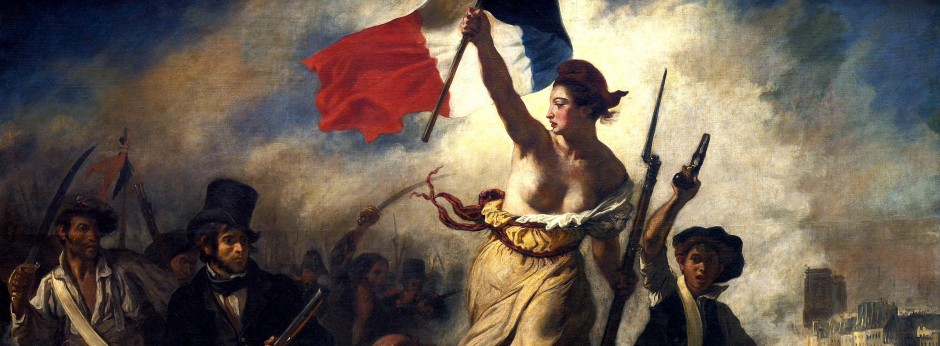My first passion blog post of the semester goes out to Wilson, who gave me my first request: the folklore of the Caribbean! Now, when I say Caribbean, that includes islands like Cuba, the Dominican Republic, Jamaica, Puerto Rico, and especially Haiti, which had the highest amount of slave trafficking in that region. This is important because there are plenty of places in the Americas where slaves brought along their tribal religions, but the Caribbean mythology derives in particular from the Dahomey, Ebo and Yoruba tribes in Africa, who were brought en masse to Central America to be slaves. The type of religion which developed there is one of the most unique I’ve ever researched. It’s a melting pot African, Spanish, and Creole cultures. I imagine it as though Christian characters went out the back door to practice voodoo with some African tribal gods.
What it’s all developed into is something called “Voodou;” the “Voo” meaning introspection, and “Dou” meaning the unknown. This is far from your Hollywood stuffed dolls with pins sticking out of them, but rather a production of a rich, provocative, and beautifully dark culture. Here are some highlights.
Bondye is the equivalent of Yahweh in the Christian religion. He is the supreme mono-god, and generally appears very aloof. He is considered the creator of life and humanity, and all of it belongs to him. Unlike the Christian God, he’s unlikely to help you if you ask, so it’s advised you don’t bother praying to him. Also unlike the Christian God, he has a wife: the mother Goddess, Gran-met. However, it’s sometimes thought that Gran-met is actually just a female manifestation of Bondye. Most people who practice Voodou will tell you that whichever story you believe is a personal preference.
In keeping with our shady Christian themes, Bondye and Gran-met are often accompanied by the spirits of Loa–the equivalent of angels, demons, or Catholic saints. Their primary purpose is to guide you or–more literally–ride you when you’re “prancing and trancing.” In short, the Loa are spirits of possession.
But to get off this Christian train, I now present to you Baron-samedi— who is by far the most stylin’ spirit of the dead (As you can see in the picture to the right). Possibly the most infamously famous God of the Voodou Pantheon, he is about one step down from Bondye, and commands the Guede (death and fertility) family of the Loa. He usually appears as a tall, skinny man in a black suit, shiny top hat,and a dinner jacket, with a white, skull-like face and cotton plugs in his nose (as if he’s dressed to be buried in a traditional Haitian funeral). I think he actually looks a bit like a sassy Wilson… except more dead, I guess. Baron-samedi is noted for obscenity and debauchery, and has a particular fondness for tobacco and rum spiked with hot peppers. He’s constantly making filthy jokes to the spirits in the realm he resides in. Despite this, the Baron is a god you’ll want to pray to, especially if you ever find yourself caught up in a nasty hex. As long as Baron-samedi refuses to dig your grave, the hex cannot kill you (#ProTip).
who is by far the most stylin’ spirit of the dead (As you can see in the picture to the right). Possibly the most infamously famous God of the Voodou Pantheon, he is about one step down from Bondye, and commands the Guede (death and fertility) family of the Loa. He usually appears as a tall, skinny man in a black suit, shiny top hat,and a dinner jacket, with a white, skull-like face and cotton plugs in his nose (as if he’s dressed to be buried in a traditional Haitian funeral). I think he actually looks a bit like a sassy Wilson… except more dead, I guess. Baron-samedi is noted for obscenity and debauchery, and has a particular fondness for tobacco and rum spiked with hot peppers. He’s constantly making filthy jokes to the spirits in the realm he resides in. Despite this, the Baron is a god you’ll want to pray to, especially if you ever find yourself caught up in a nasty hex. As long as Baron-samedi refuses to dig your grave, the hex cannot kill you (#ProTip).
But if you do die, you won’t have to worry too much, especially if you get picked up by his wife, Maman-brigitte. She’s so chatty and full of jokes, that it’s actually fun when you’re escorted to the Underworld.
Well, I’m already over the word count, and I haven’t introduced you to half of the Voodou pantheon yet. As I mentioned, there’s simply so many influences that the lore is practically overflowing with stuff. I’d have to write a book. However, if you’re interested in finding out more, go to this site: http://www.godchecker.com/pantheon/caribbean-mythology.php
The descriptions of the gods and goddesses are a little sparse, but it will point you in the right direction. I recommend exploring their characters there, and then looking for more depth descriptions of the ones you like on Wikipedia.
That’s all I got for now. I await your requests for next week!
